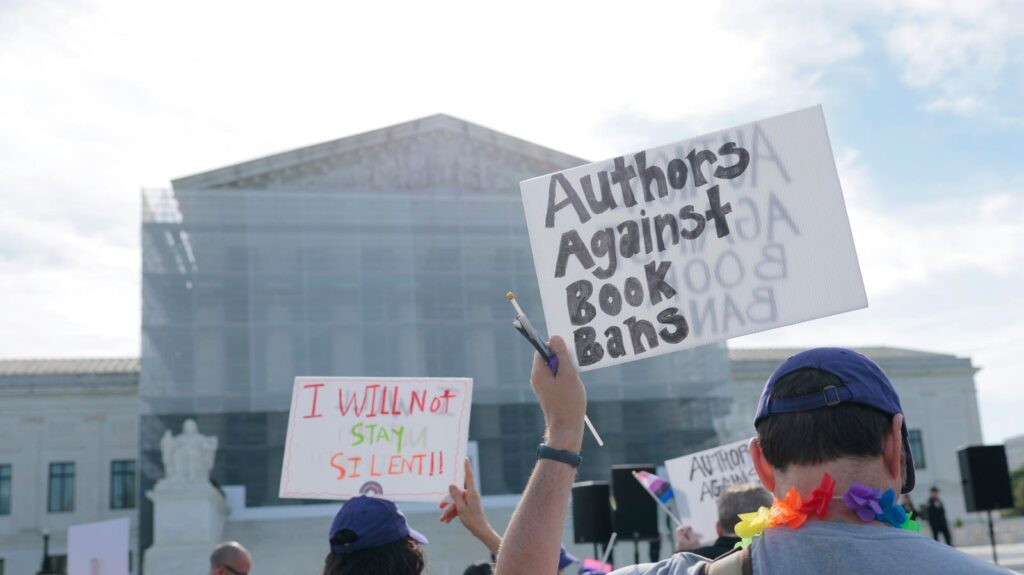Topline
The Supreme Court cleared the way Friday for parents to broadly object to content in schools that they find objectionable on religious grounds, a ruling that centers on books with LGBTQ themes—but critics warned could “radically change” what public schools teach.
Protesters in support of LGBTQ+ rights and against book bans demonstrate outside of the Supreme … More
Key Facts
The Supreme Court ruled 6-3 along party lines in Mahmoud v. Taylor, a dispute over the school district in Montgomery County, Maryland, and its decision not to let parents opt their children out of being exposed to children’s books with LGBTQ themes, on the basis of it conflicting with their religion.
The court granted an injunction that allows the parents to opt their children out of the books as the case moves forward, ruling the parents are likely to ultimately prevail in the case.
The school district added several books with LGBTQ themes—like about a child attending their uncle’s same-sex wedding, and a dog getting lost at a Pride parade—as part of a broader mission to diversify their instructional materials, and while the district initially let parents opt their children out of reading the materials, it later changed the policy after the slew of children opting out became “unworkable.”
Parents—who are Muslim, Roman Catholic and Ukrainian Orthodox—sued the district, claiming the inability to opt their kids out of being exposed to the books violated their First Amendment right to freedom of religious expression and forced them to “surrender their right to direct the religious upbringing of their children.”
Justice Samuel Alito, writing for the court, said the parents’ religious liberties were likely violated, arguing the government “burdens the religious exercise of parents when it requires them to submit their children to instruction that poses ‘a very real threat of undermining’ the religious beliefs and practices that the parents wish to instill,” and governments “cannot condition the benefit of free public education on parents’ acceptance of such instruction.”
The court’s liberal justices dissented from the decision, with Justice Sonia Sotomayor writing the court’s ruling “will be chaos for public schools,” and while public schools “offer to children of all faiths and backgrounds an education and an opportunity to practice living in our multicultural society, that experience “will become a mere memory if children must be insulated from exposure to ideas and concepts that may conflict with their parents’ religious beliefs.”
Chief Critic
“Today’s ruling threatens the very essence of public education. The Court, in effect, constitutionalizes a parental veto power over curricular choices long left to the democratic process and local administrators,” Sotomayor wrote in her dissent, which liberal Justices Elena Kagan and Ketanji Brown Jackson joined. “That decision guts our free exercise precedent and strikes at the core premise of public schools: that children may come together to learn not the teachings of a particular faith, but a range of concepts and views that reflect our entire society. Exposure to new ideas has always been a vital part of that project, until now.”
Tangent
The dispute over Montgomery County’s policies comes as a number of states have already passed laws regarding children’s instruction on sexual orientation and gender identity, and parents’ rights to object to it. Florida’s Parental Rights in Education law—known as “Don’t Say Gay”—was the most controversial when it was enacted in 2022, but similar laws restricting such instruction or giving parents the right to opt out of it have also been enacted in Arkansas, Montana and New Hampshire. Texas also allows parents to opt children out of any “objectionable” content, while Arizona, Tennessee and Wyoming require parents to instead “opt-in” to any instruction on sexual orientation and gender identity.
Key Background
The parents suing Montgomery County went to the Supreme Court after both lower district and appeals court judges sided with the school district, shutting down the plaintiffs’ efforts to opt their children out of the LGBTQ-themed books. The dispute over the district’s policies comes as recent culture wars have caused upheaval when it comes to public education, as objections by parents and GOP lawmakers to instruction on topics like LGBTQ issues have sparked book bans and laws like Florida’s “Don’t Say Gay.” Advocacy group PEN America has tallied nearly 16,000 book bans since 2021, a number the group says is higher than any period since McCarthyism in the 1950s. More than 10,000 book bans took place during the 2023-2024 school year alone, the highest year on record. The Trump administration, which filed a brief in the Montgomery County case urging justices to side with the parents, has also sought broad changes, seeking to dismantle the Department of Education as President Donald Trump has more broadly taken aim at LGBTQ rights and diversity, equity and inclusion policies. Some Democratic-led states have also passed measures in response to the new attacks on books and public school instruction, with states including California and Illinois passing laws that outlaw book bans.
Further Reading
Supreme Court considers parents’ efforts to exempt children from books with LGBTQ themes (SCOTUSblog)
Supreme Court’s conservatives are poised to strike down elementary school policy denying opt-outs for LGBTQ+ books (CNN)
Authors in Supreme Court LGBTQ books case detail ‘surreal’ fight (The Hill)
Read the full article here
